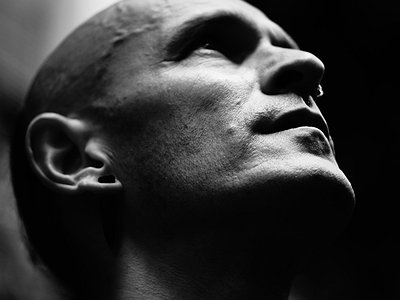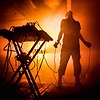Part 2
There are many descriptions of the ideal state of mind for being creative. What is it like for you? What supports this ideal state of mind and what are distractions? Are there strategies to enter into this state more easily?
I find this kind of thing unformulatable, as interesting as it would be. Like with most things I think practice helps. Other than that - any way I turn a possible answer I find the opposite of that answer as likely, too. For me, intentionality and honesty have always been key ingredients. Intensity is also key but even here, to formulate what kind of intensity that is and how it can happen seems impossible as it follows no rule.
How is recording in the field and editing the music in the studio connected? What do you achieve and draw from each experience personally? How do you see the relationship between improvisation and composition in this regard?
Well it's connected through me, as the being in the field and wherever I place my then-attention, and then in the studio, through selecting/extracting/enhancing that attention and combining it with possible new attentions that then might occur. What I wish to achieve is informed by the intentionality of those attentions with all the existentialist connotations that come with it – it's a large picture. This distinction between 'composition' and 'improvisation' seems a bit random to me, their borders flow into each other, their 'status' can change, and both are part of 'experimenting'. Life seems 'experimental' to me by definition, a matter of trying things and (hopefully) learning from them, having an idea about where one would like to go but also being vigilant about the things that happen on the way there.
How do you see the relationship between the 'sound' aspects of music and the 'composition' aspects? How do you work with sound and timbre to meet certain production ideas and in which way can certain sounds already take on compositional qualities?
These parameters don't really enter my conscious realm of dealing with sound/music/composition. Many recordings I make already could seem like finished compositions, but they also become part of a “sound-bank” that can be re-used and recontextualised.
Our sense of hearing shares intriguing connections to other senses. From your experience, what are some of the most inspiring overlaps between different senses - and what do they tell us about the way our senses work? What happens to sound at its outermost borders?
I assume that our senses inter-connect in different ways, and to separate senses is only a rational way of trying to understand that. Also I reckon we might have senses that are yet unnamed. Sound is a language, a vibration, a communication and it depends on individual levels of evolution and sub/un/consciousness how these sense-combinations co-relate. Trying to describe what sound does, or how it works, is, if I'm correctly informed, still a matter of philosophical debate. For me this kind of question is linked to a very general question of the human potential and human evolution, and since we're a very young animal we have most of what there is to be explored still in front of us. If we don't blow ourselves or this planet up in the meantime.
Art can be a purpose in its own right, but it can also directly feed back into everyday life, take on a social and political role and lead to more engagement. Can you describe your approach to art and being an artist?
For me the trajectory of art and culture is linked to a „task“ or „mission“, not by necessity (for the sake of balance) but as an „also“ for those interested in more than decoration or commerce. This „mission“ consists of attaching question-marks to so-called reality, of asking questions, of challenging, of showing limitations, of pushing limits, of crossing boundaries, to try, to test, to transgress, to scrutinise habits and patterns, to feel further, to tickle the consciousness, maybe to change it, to suggest ideas that think ahead, to create states of trance and liberation, and more.
The “artist”, then, is possibly someone, part of a social context, that contributes, to his or her direct environment, and therefore is responsible to ask questions, to be critical, to break rules, to use one's voice, to communicate, to inspire, to push forward, and so to contribute to society and to the evolution of this species, and so to life and to coesxistence on this planet.
It is remarkable, in a way, that we have arrived in the 21st century with the basic concept of music still intact.
What is the basic concept of music?
Do you have a vision of music, an idea of what music could be beyond its current form?
What I hope for is that the role of art and culture is recognised more and more as a driving force of human development and not just as entertainment and business. with this realisation, hopefully, will come the appreciation of music or sound as an art that can open doors, that can nurture senses, beyond just being a tool that fills or balances the voids created by the rat race. And I hope that we can learn to listen.






